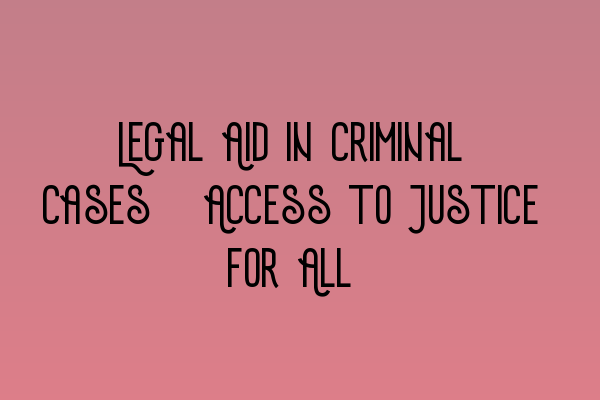Legal Aid in Criminal Cases: Access to Justice for All
In the criminal justice system, every individual is entitled to a fair trial and access to legal representation. However, not everyone can afford the high costs associated with hiring a private criminal defense lawyer. This is where legal aid comes into play, providing assistance to those who cannot fully afford legal services. In this article, we will delve into the importance of legal aid in criminal cases and how it ensures access to justice for all.
The Role of Legal Aid
Legal aid plays a vital role in safeguarding the principle of equality before the law. It ensures that everyone, regardless of their financial means, has the opportunity to defend themselves effectively in criminal proceedings. Without legal aid, the scales of justice would heavily tip in favor of those with deep pockets.
Legal aid helps level the playing field by providing financial support to individuals who would otherwise struggle to navigate the complex legal system. It allows them to hire competent lawyers who are well-versed in criminal law and can advocate for their rights.
Eligibility for Legal Aid
Not everyone is eligible for legal aid in criminal cases. The criteria for qualification are based on income and the seriousness of the alleged crime. Typically, individuals with low income and those facing more severe charges are more likely to receive legal aid.
To determine eligibility, a means test is conducted to assess the applicant’s financial circumstances. The test takes into account income, assets, and other factors. If the applicant meets the income threshold and passes the means test, they may be granted legal aid.
The Benefits of Legal Aid
Legal aid offers several benefits to those facing criminal charges. Firstly, it ensures that defendants can receive expert legal advice and representation, enabling them to present their case effectively. This is crucial, as the outcome of a criminal trial can have significant consequences on a person’s life.
Secondly, legal aid promotes the principle of fairness and equality in the justice system. By providing assistance to those who would otherwise be unable to afford it, it prevents unjust disparities based on financial capabilities. It allows individuals to challenge wrongful charges, seek justice, and protect their fundamental rights.
The Challenges
While legal aid is essential, there are certain challenges associated with its implementation. The limited availability of resources and funding is a significant concern. The demand for legal aid often exceeds the allocated budget, resulting in many individuals being unable to access the assistance they require.
Add to this the complex criteria for eligibility and long waiting times for legal aid applications, and it becomes clear that there is room for improvement in the legal aid system. Efforts must be made to ensure that legal aid is accessible to those who genuinely need it.
Conclusion
Legal aid in criminal cases is crucial for ensuring access to justice for all individuals, regardless of their financial circumstances. It helps level the playing field and ensures that everyone has a fair chance of presenting their case effectively in court. However, there are challenges that need to be addressed to ensure the availability and efficiency of legal aid services.
If you’re interested in learning more about the SQE (Solicitors Qualifying Examination) and criminal law, check out these related articles:
